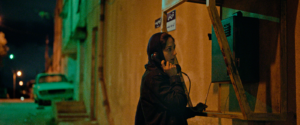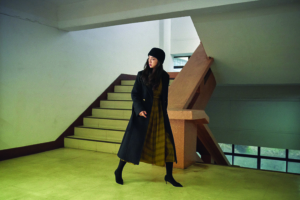As Rosa Reyes (Jaclyn Jose) surveys the world around her, little about it pleases the eye. Nor should it – she lives, poverty-stricken, in a shantytown in Mandaluyong, east of the Philippine capital of Manila, her surroundings proving a bleak yet busy ecosystem of hardship where aesthetics are the furthest thing from anyone’s mind. Her community is driven by practicality; surviving is their primary aim. Anything else is immaterial, even the promise of a different future that comes from an advertisement on the side of a bus that heralds, ‘It’s your lucky day.’
The irony provoked by the ad’s glossy message doesn’t escape attention in Brillante Mendoza’s Ma’ Rosa (2016) – standing out against the slums, the promotional slogan peddles insincere hope in a place where such throwaway dreams mean nothing. The juxtaposition is deployed naturalistically but purposefully by the director, particularly given the unsightliness that fills the frame. The director doesn’t just cast the lens over grime, grit and urban chaos, but also wields the camera as a tool to interrogate the hideousness seething beneath the feature’s realistic scenario.
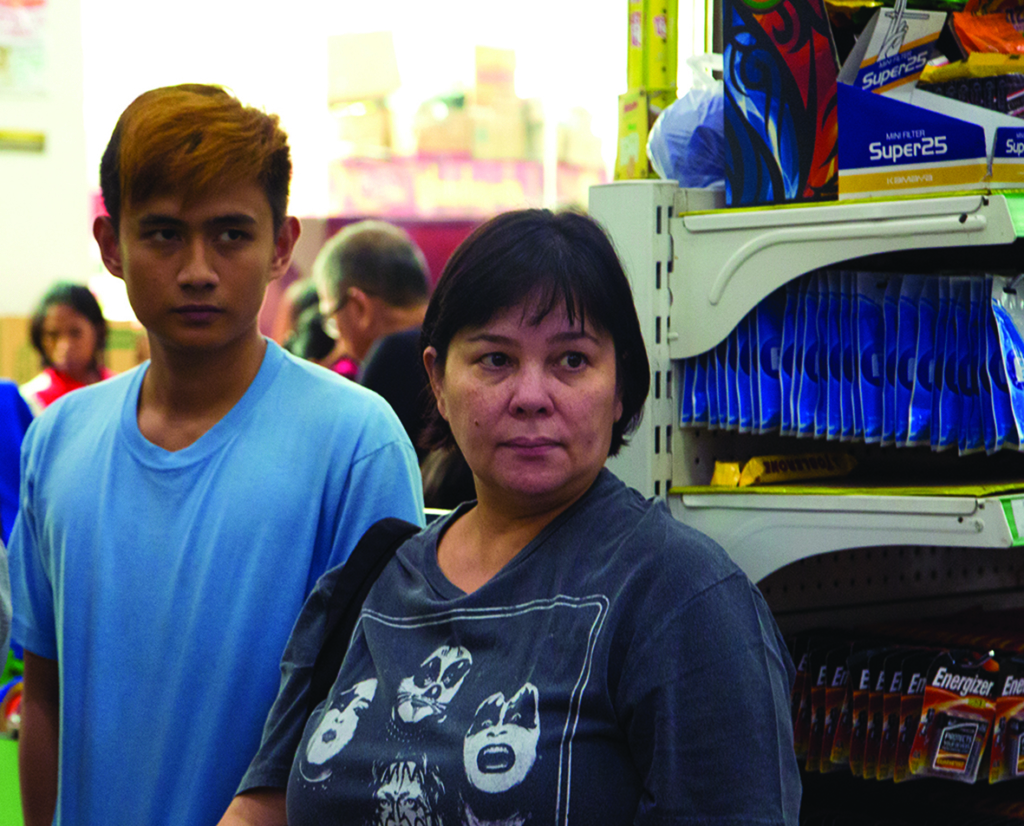
Indeed, Ma’ Rosa is a film of ugliness – not simply about it, but made with the aim of thrusting the visceral, visible unpleasantness of its titular character’s life, and of the many that she represents, into the audience’s purview. As Mendoza has often done across his twelve-year career, here he favours social realism, calling attention to the plight of those among the populace who persevere through days that the better-off have never experienced. For this Filipino filmmaker fond of exposing the corruption and inequity in his country, however, mere depiction isn’t enough; immersion is imperative to ensure his portraits of the disadvantaged and taken-advantage-of truly communicate their political message.
While the aforementioned ad makes its appearance early on in Ma’ Rosa, its incongruence with everything else in sight subsequently lingers over everything that follows. Viewers first meet Rosa as she rages against a supermarket clerk who is unable to give her the correct change, with every peso clearly mattering to the business owner and matriarch. She’s there with her teenage son, Erwin (Jomari Angeles), buying instant noodles she’ll then sell for a profit at her neighbourhood’s convenience store, the main source of income for her family. Co-run by her drug-dabbling husband, Nestor (Julio Diaz), the shop also brings in cash as a front for dealing crystal meth. Just as every coin makes a difference, every possible method of making money does as well (in an above-board transaction that exemplifies Rosa’s financial resourcefulness, she lends her karaoke machine to her neighbours – for a fee).
Certainly, there’s nothing lucky about Rosa’s life, even with her pragmatic savvy for boosting the meagre contents of her wallet – though the notion of fortune drifts even further from her orbit when the police suddenly come calling. Finding illicit substances as well as a record of the couple’s illegal trade, Officer Lopez (Baron Geisler) and his colleagues take Rosa and Nestor to the local station to propose their own unlawful plan: if the duo can raise 200,000 pesos, they’ll be released without charge. If they can’t, they can turn over their supplier, Jomar (Kristoffer King), so that the cops can extort the funds from him instead. The end result falls somewhere in the middle: after informing on their contact, they’re still forced to raise the shortfall.
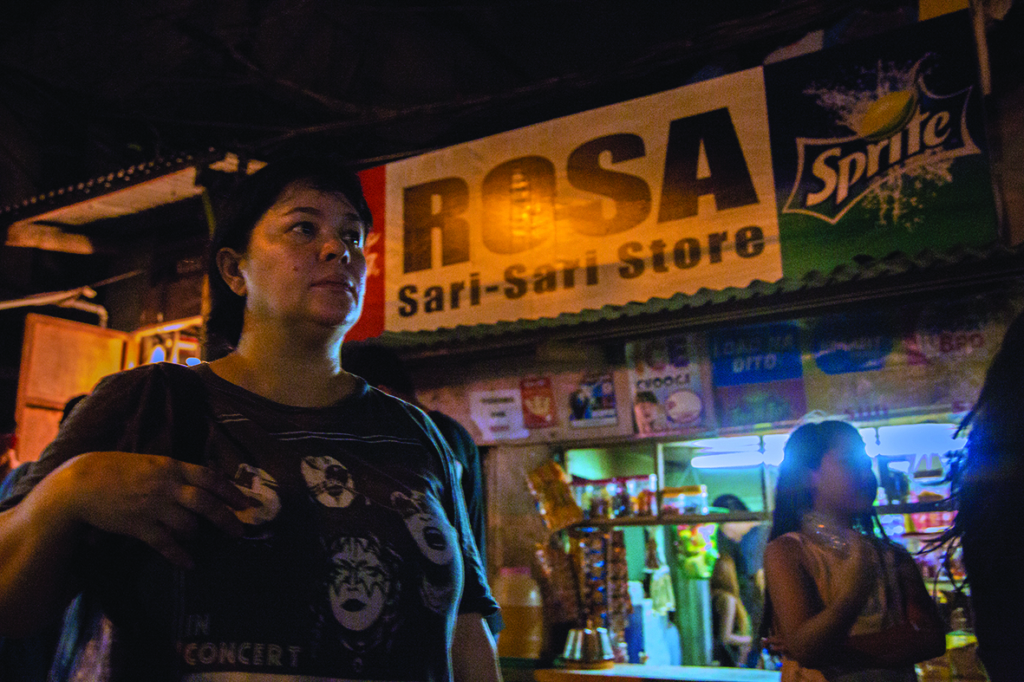
Detained in the beige-walled building, there’s little that Rosa and Nestor can do to fulfil their end of the unjust bargain, which is where Erwin and his siblings come in. Older brother Jackson (Felix Roco) embarks on a quest to sell their television, a task that proves easier said than done in a community just as cash-strapped as the Reyes family. Sister Raquel (Andi Eigenmann) is sent to scrounge up whatever she can from friends, relatives and acquaintances – again, a far-from-straightforward job. As for Erwin himself, he takes the responsibility of earning the required money to its most intimate extreme, agreeing to have sex with an older man for payment.
Ma’ Rosa doesn’t simply let its tale do the talking. The film’s plot isn’t overly complex, but it is fuelled by an antipathy towards the status quo that punishingly forces itself on its protagonists.
Mendoza doesn’t couch the siblings’ efforts, nor Rosa and Nestor’s long wait while police officers use pilfered funds to indulge in beer and fried chicken, in overt emotion. Working with a script penned by Troy Espiritu, the director shies away from speeches or blatant expressions of pain, instead letting the characters’ lack of outward manifestations of hurt say much – and, when feelings do manifest, we see them only in glimpses cracking through wearied facades. A pivotal late scene that sees Rosa out of custody and desperate to obtain food from a street vendor confirms the potency of the filmmaker’s approach. This choice, however, is also guided by actuality: as the narrative makes plain, such opportunities to display unrestrained sentiment are as scarce as the good fortune promised by advertisements – and just as impractical, too.
Of course, Ma’ Rosa doesn’t simply let its tale do the talking. The film’s plot isn’t overly complex, but it is fuelled by an antipathy towards the status quo that punishingly forces itself on its protagonists. Mendoza and Espiritu chart the Reyeses’ modest existence, the influence of police interference and the price required for them to return to the far-from-ideal reality that they call their own. The feature privileges showing over telling, the director drawing on the street-level visuals that have served everything from his Locarno Golden Leopard – Video co-winner The Masseur (2005), to his Cannes Best Director–earning Kinatay (2009), to his typhoon-survival drama Trap (2015) so well. Ma’ Rosa lurks among the hustle and bustle to demonstrate that the grimness of life doesn’t stop there. In a realm where unhappiness is such a gnawing constant that it no longer bears addressing, embracing ugliness is impossible to avoid.
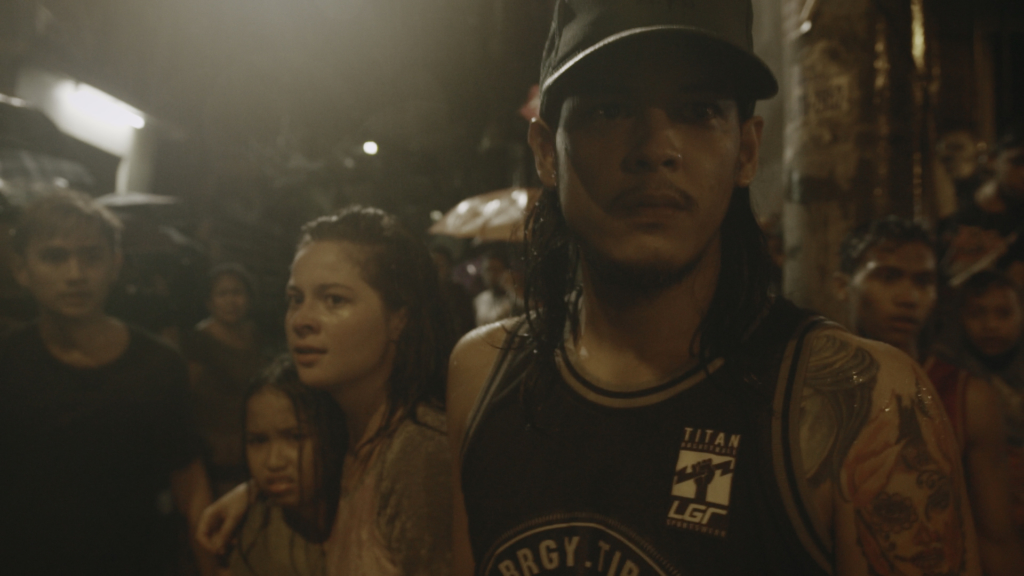
Cinema frequently delves into unpleasant situations like Rosa’s – in which class disparities dictate the standard of living; in which the chasm between the haves and have-nots is vast, with no signs of diminishing; in which using power to get ahead is as much a display of might as it is a survival mechanism for those higher up the food chain; and in which the concept of contentment, in the advertised sense, is nothing but fodder for fantasies. Social-realist filmmakers have been doing so since the Italian neorealists illustrated the artistic and emotional impact of hewing close to actuality, rather than conjuring big-screen idylls or relishing in film’s escapist tendencies; since then, various sectors of post–World War II cinema across Europe and beyond have followed the same path. Indeed, diving into the unvarnished and the unglamorous has long remained a movie-making fascination, driving narratives and inspiring thematic contemplations.
In the social-realist works of Vittorio De Sica (Bicycle Thieves, 1948), Ken Loach (spanning everything from 1969’s Kes to 2016’s I, Daniel Blake) and Andrea Arnold (2009’s Fish Tank and 2016’s American Honey), to name just a few, bleakness prevails – but so does an affinity for images both sobering and poetic, fashioned to give tales of struggle both the veneer of documentary and a sliver of beauty. Where Mendoza’s output stands apart is his penchant for doing the opposite, serving up authenticity without the garnish. Having their fictions misconstrued as fact is something his films share with those of his fellow social-realist filmmakers; in his case, however, this is heightened by his frenetic and frenzied visuals. Ma’ Rosa isn’t easy to look at, but its revelling in the unattractive is never less than fitting or effective.
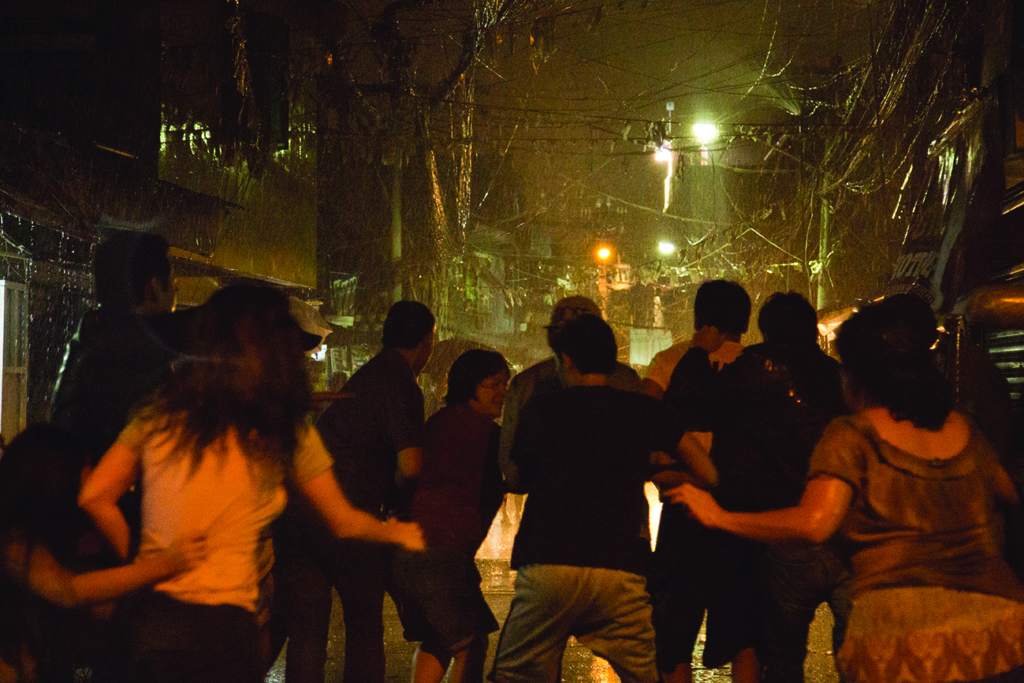
A common complaint about modern cinema concerns the emergence of shaky camerawork as a stylistic tool, typically stemming from the decision to use a handheld camera. Found-footage films have made it a staple, as evidenced in The Blair Witch Project (Daniel Myrick & Eduardo Sánchez, 1999), Cloverfield (Matt Reeves, 2008) and many more; action features have likewise employed it to increase the immediacy of their chases and fights, as continually seen in the Bourne films to date (2002–2016), among others. American Honey utilises it to bring viewers closer to the perspective of the protagonist, Arnold’s frames rumbling with movement while still lyrically composed in their vantage point over Middle America. In a similar fashion, Mendoza rarely lets his images keep still – drawing audiences into Rosa’s ever-moving world and mindset, and showing that a moment of peace is never possible – but he differs in that he doesn’t temper these moments of instability with pretty sights.
When Rosa tries to hail a taxi after her supermarket visit, the camera shakes. When police arrive at her store, it quakes with movement. When she’s sitting in the police station, it’s as jittery as the victimised. Watching money change hands on multiple occasions, it trembles. When characters run, the image bobs up and down, Mendoza’s crew sprinting along with them. The technique isn’t unusual, but the impact is relentless here. Weaving and wobbling are as much a part of the movie as Rosa herself; even when the camera zooms in on her as she’s thinking or watching another chained-up detainee take a drag from a cigarette, restlessness remains a constant.
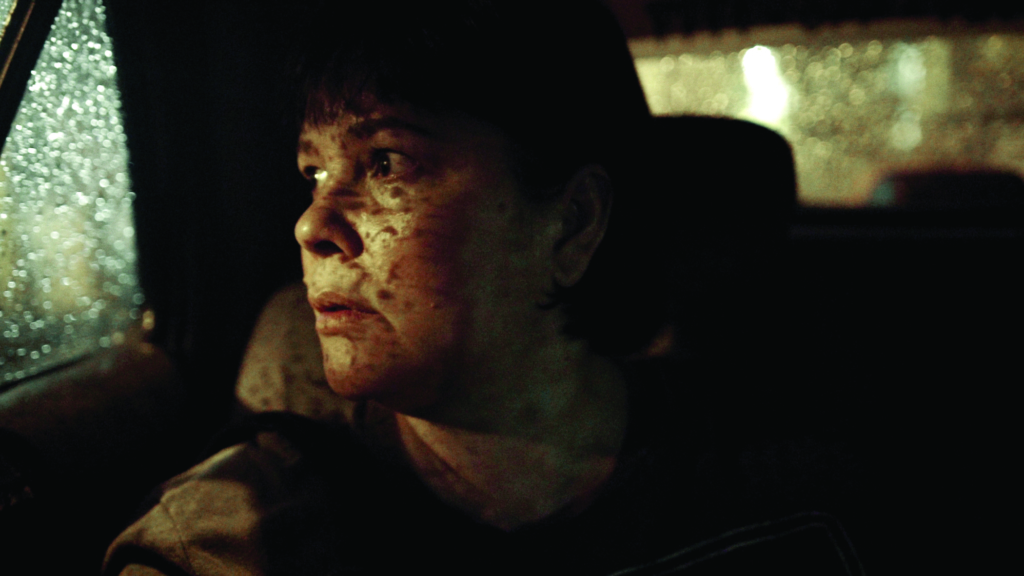
The effect – aesthetically, emotionally, narratively – is immediately apparent and inescapable, reinforcing the mayhem that surrounds Rosa at every turn. But Mendoza then builds on the queasy cinematography through deliberate lighting choices, which are naturalistic but always noticeable. In some scenes, Ma’ Rosa is doubly lit, flitting between dim and glaring. On the streets, darkness permeates even when lights glow above and daylight breaks through; there’s no such thing as unfettered brightness in Rosa’s life. Inside the police station, neutral-coloured surfaces and fluorescent overhead lighting starkly contrast with the inky-at-worst, grey-at-best atmosphere outside, emphasising how Rosa has suddenly been thrust into the spotlight.
The end result tests the viewers’ gaze – unsurprisingly, and by design – but it also demands their attention: what is difficult to watch is also difficult to look away from. It’s Mendoza’s commitment to his political commentary that has made him a Filipino filmmaking powerhouse, the prolific director channelling the perspective of his characters into a microcosm of his society. He isn’t indulging morbid curiosity, facilitating rubbernecking or letting audiences play tourist among the less fortunate; instead, he is eliciting empathy by immersing rather than depicting, and by showing how even a simple advertisement many wouldn’t think twice about becomes a cruel reminder of the futility of hoping for something better. Or, considered a different way, he takes the life of austerity accepted as an unhappy but unshakeable reality by Rosa and others like her, then gives viewers a similarly stark lens through which to explore it. To see, understand, feel for and relate to his titular figure in Ma’ Rosa is to walk in her shoes as much as the medium of cinema makes possible.

